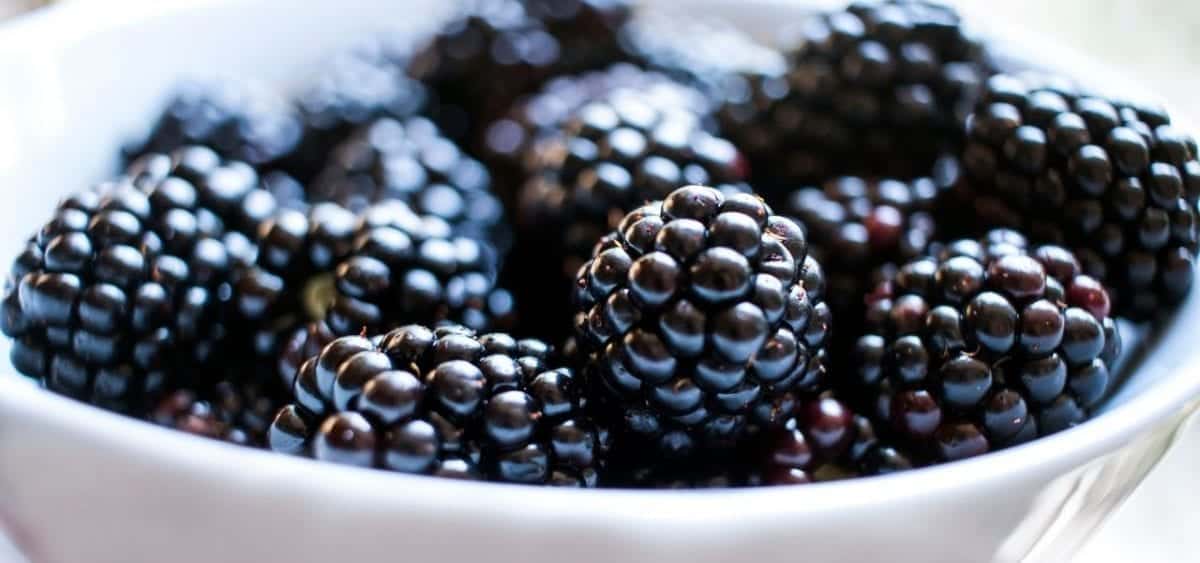Home > Hormones > Hormone health & solutions > Hedgerow Healing: The Benefits of Blackberries


I grew up in the countryside, I’ve been around fields and farmland most of my life. And one the most quintessential sights on the English hedgerows around fields, are blackberries. Coming in around the later summer, filling the air with that signature scent. There’s something about having your hands, and face stained with blackberry juice that makes me feel like a kid again. And side from putting them in a pie or making jam, blackberries have plenty of others uses. Given that they are such a widely accessible fruit, it’s strange that we don’t encourage them in our diets as much as other healthy things. Local and self-harvestable, if there are blackberry bushes around you, or as a better alternative to other berries currently out of season and to avoid imported goods; pick or purchase yourself some blackberries for these health benefits.
Blackberries are loaded with vitamins C and K. Vitamin C is important for keeping our cells healthy and protecting them. It keeps our skin, bones, blood vessels and cartilage healthy as well as helping with wound healing. A lack of vitamin C can lead to scurvy. Vitamin K is often found in leafy greens, so for those of us not keen on kale, blackberries are a pretty good alternative. K is important for blood clotting and helping wounds to heal, and some evidence suggests that it is beneficial for keeping our bones healthy.
This mineral is very good for the body.
Manganese is a trace mineral that we need small amounts of that can also be found in leafy greens, tea and seeds. An essential nutrient stored in the handy blackberry.
Blackberries are high in fibre, which, as I hope we all know, is an integral part of our diet. High fibre diets can:
Not getting enough fibre can lead to constipation and bloating, so considering there’s 8g of fibre in a cup of blackberries, they’re a pretty useful fruit to have so freely available.
As well as doing all these great things inside the body, blackberries can do good for our oral health. Blackberry extract is thought to contain antibacterial and anti-inflammatory properties against bacterial that can cause oral diseases.
A lot of berries are great for our brains, with antioxidant reducing free radicals to help improve brain function and reduce memory loss. Blackberries are no exception to this, helping to reduce brain inflammation that leads to better overall cognitive function and motor issues particularly as we age.
You can also try blackberry leaf tea for when they’re out of season, which is good for your guts, fever, sore throats and gout. Don’t know how many of you out there have struggled with gout, but blackberries, helpful. Make some yourself with some handpicked leaves, bruised and fermented for a few weeks, then dry them out and make tea as usual.
Loaded with vitamins and minerals, low calorie, high fibre, full of antioxidants and low in fat and carbs, blackberries are a sweet, local and affordable alternative to some of the pricier superfoods out there. And, really, best when picked yourself.
Watch out for the brambles though, and make sure you’re not nicking them from someone else’s garden.
Check out more hedgerow remedies here!

-


Dr Singh is the Medical Director of the Indiana Sleep Center. His research and clinical practice focuses on the myriad of sleep.

Understanding the female libido Before we can answer, “Does progesterone increase sex drive?” it’s important to gain a better understanding of what a “sex drive” means. The female libido or sex drive is how much you desire sexual activity. Every

Why am I so hungry before my period? Women who experience an increased appetite before period starts can feel frustrated that they’re craving foods they don’t normally eat. You may be wondering, “Why do I eat so much before my

Understanding cycle syncing workouts Did you know that evidence shows a link between the impact of exercise and menstrual cycle phases in women? It’s true. Women are at a higher risk of foot and ankle injury during workouts than men,
Hormona© 2025, All Rights Reserved
| Cookie | Duration | Description |
|---|---|---|
| cookielawinfo-checkbox-analytics | 11 months | This cookie is set by GDPR Cookie Consent plugin. The cookie is used to store the user consent for the cookies in the category "Analytics". |
| cookielawinfo-checkbox-functional | 11 months | The cookie is set by GDPR cookie consent to record the user consent for the cookies in the category "Functional". |
| cookielawinfo-checkbox-necessary | 11 months | This cookie is set by GDPR Cookie Consent plugin. The cookies is used to store the user consent for the cookies in the category "Necessary". |
| cookielawinfo-checkbox-others | 11 months | This cookie is set by GDPR Cookie Consent plugin. The cookie is used to store the user consent for the cookies in the category "Other. |
| cookielawinfo-checkbox-performance | 11 months | This cookie is set by GDPR Cookie Consent plugin. The cookie is used to store the user consent for the cookies in the category "Performance". |
| viewed_cookie_policy | 11 months | The cookie is set by the GDPR Cookie Consent plugin and is used to store whether or not user has consented to the use of cookies. It does not store any personal data. |
